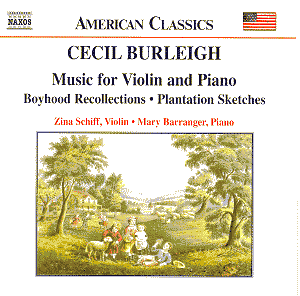To
include these modest trifles in a series called ‘American Classics’
is stretching it just a bit. If they comprised a ‘dossier’, I’d
probably accuse Naxos of ‘sexing them up’! But don’t let’s carp,
because this series has already unearthed much worthy music which
might not otherwise have seen the light of day ever again, as
well as genuine classics such as Bernstein’s Chichester Psalms,
which I shall be reviewing shortly.
Cecil
Burleigh, we are told, was an American who studied in Berlin as
a young man, before returning to Chicago to study violin and composing
at the Chicago Musical College. He taught and performed for a
time before succumbing to the lure of the big city working in
New York for some years while studying composition with Ernest
Bloch and violin with Leopold Auer. Despite this contact with
greatness, he wasn’t able to sustain a career as a composer, and
settled down in a teaching post in Wisconsin in 1921, where he
remained until 1955.
Though
he composed some large-scale music – symphonies, string quartets
and the inevitable tone-poems – the bulk of his output is made
up of music for violin and piano, much of which is presented here,
with seven suites and three independent works. The Impromtu of
track 1, composed in 1909, is fascinating in that it is a sort
of ‘clone’ of Elgar’s Salut d’amour. Indeed, so similar
is it in its phrasing, style and mood, that I wondered if it was
a deliberate conscious piece of pastiche on Burleigh’s part. It
wouldn’t be in the least bit surprising were this the case, for
Elgar’s short work is one of the gems of salon music, which, given
his instrument and his composing proclivities, Burleigh must surely
have admired. The pianist on just this track and the Cradle Song
that ends the disc is Cherina Carmel, who was also the recording’s
producer.
The
interesting point about Miss Carmel is that she was only 16 when
this recital was recorded. Perhaps we can therefore forgive her,
for the recording balance is not good, I’m afraid. Zina Schiff
and her violin are far, far too close, making it quite
a painful experience to listen to at anything above quite low
volume. This is a great pity, because she plays beautifully, and
produces a fine, rich tone. But the balance is very unkind to
her.
There
is an unintentional hilarity of the titles of many of the pieces
– ‘From a Wigwam’, ‘In the Cotton Fields’, ‘Pickaninnies’, ‘Uncle
Rastus’, and so forth. But Burleigh belonged to an age before
the restraints of the dreaded Political Correctness had begun
to bite, lucky fellow. There is nothing here to be offended by,
any more than one might be by Woodforde-Finden’s Indian Love
Lyrics or Debussy’s Golliwog’s Cakewalk. (Interestingly,
the Microsoft Word programme that I’m using to type this didn’t
recognise ‘golliwog’ and suggested ‘pollywog’ instead! Right On,
Bill Gates. But what’s a ‘pollywog’ anybody?)
The
music, however, is attractive, even charming at times, and the
naive titles are really just the most general indication of the
nature of the number concerned. Thus ‘From a Wigwam’ is a moody
piece beginning with unaccompanied muted violin; ‘Sun Dance’ has
a rather attractive rhythmic accompaniment in the piano, reminiscent
of Grieg in his ‘troll’ vein. On the other hand, ‘Uncle Rastus’
is, confusingly, an energetic dance in Bohemian style, very much
influenced by Dvořák; and ‘Minstrels’ is a hectic, rather
irritable piece. Perhaps Burleigh’s experiences of minstrels were
not happy ones.
For
me, the most successful group was the Characteristic Pieces of
1910. The opening ‘Idyle’ is a delightfully carefree little ditty,
while ‘The Lament of a Rose’ is the most impassioned piece in
the collection, with an intense, sustained melody. The title and
the expressive content of this and other pieces remind us of the
debt Burleigh owed to another American composer – Edward MacDowell,
25 years Burleigh’s senior, and immensely influential on this
subsequent generation of composers. His most famous work remains
‘To a Wild Rose’, which is why this particular track brings the
connection strongly to mind. These Characteristic Pieces end with
an effervescent ‘Bolero’.
All
the pieces are extremely short – Burleigh clearly didn’t want
to overtax his audiences! He rarely breaks the ‘two-minute barrier’
(except in the Characteristic Pieces, which may be why they stand
out as more impressive than the others). Even the latest of the
suites, ‘Boyhood Recollections’, has this characteristic brevity.
In common with many of the tracks, I would strongly commend ‘Sweet
Romance’ and ‘Jim’ as highly effective possible encores for certain
recital programmes.
And
in a sense that’s what this is – a disc of thirty-nine tiny, albeit
attractive, encores, and the effect is rather like eating dozens
of canapés in place of a real meal – not something
to be recommended, and liable to leave you dying for a good old
Mahlerian blow-out.
There’s
much to relish here, nonetheless. Zina Schiff is a really splendid
violinist, a pupil of Heifetz, and a performer of distinction
who puts her heart, soul and considerable expertise at the service
of these forgotten miniatures. It’s a pity that she is poorly
served by the recording; but adjust the volume to a comfortable
level and sit back and enjoy the artistry.
Gwyn
Parry-Jones

